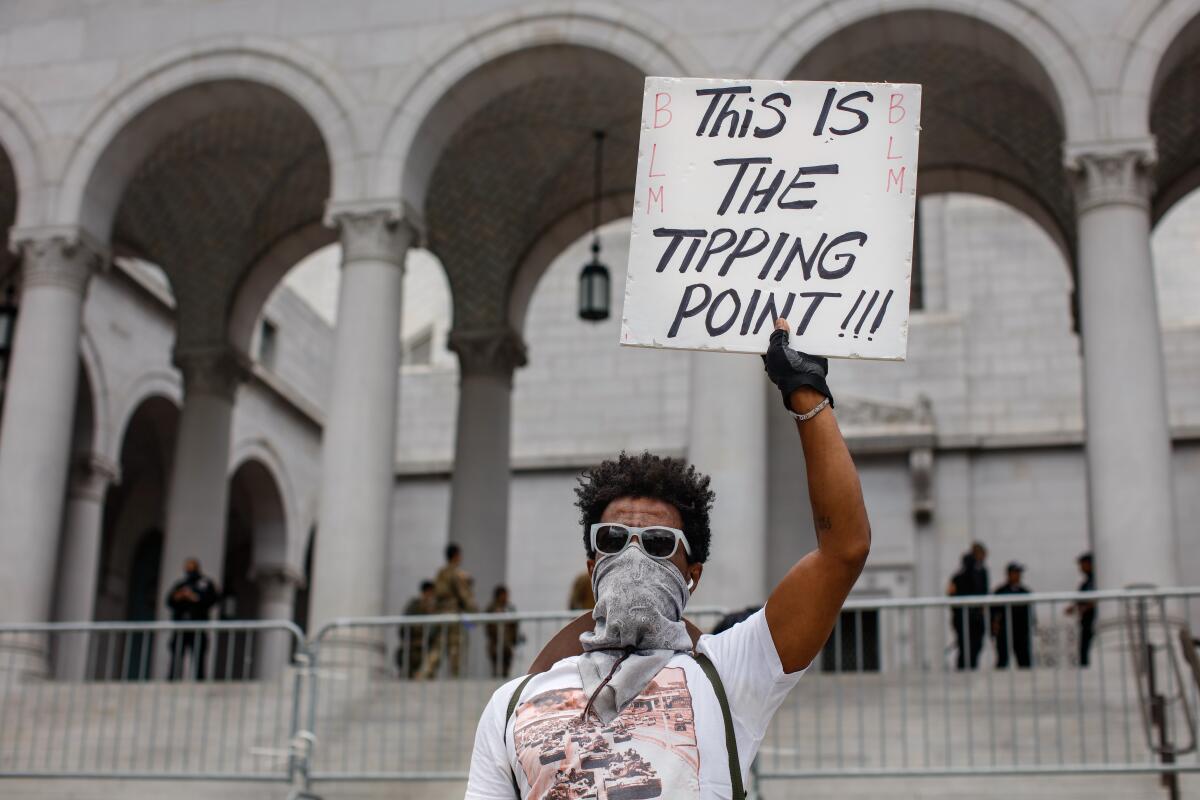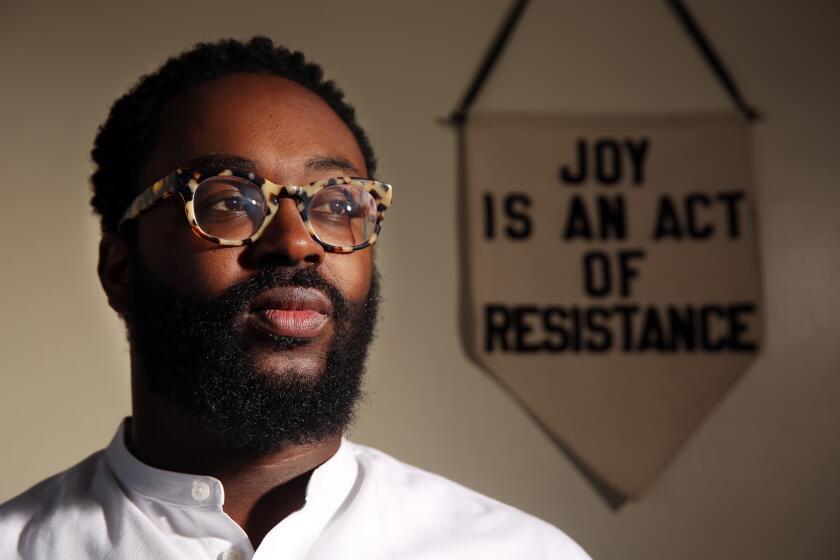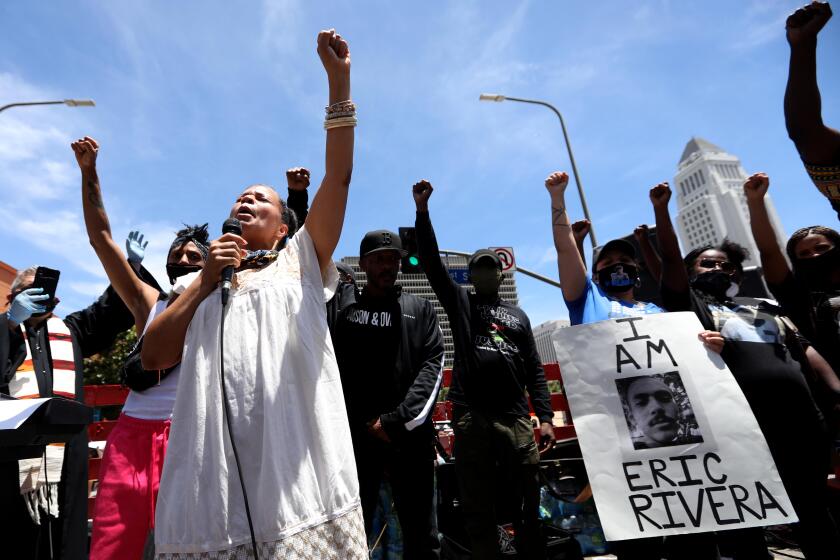Antiracism as government policy? County supervisors will decide soon

- Share via
The antiracism movement in Los Angeles County is moving from protest marches to the halls of power.
On Tuesday, the L.A. County Board of Supervisors is slated to begin debate over a proposal aimed at strengthening county efforts to address racial inequality.
Introduced by the county’s lone Black supervisor, Mark Ridley-Thomas, and inspired by the protests over the Minneapolis police killing of George Floyd, the measure would attempt to shape the county bureaucracy around potentially holding county officials accountable if they fail to uphold more aggressive antiracist policies.
If passed, Los Angeles County would become the 24th county in the country since last year to declare racism a matter of public health, according to the National Assn. of Counties.
“I’m hoping this will cause people to be more serious about the very demeaning and disenfranchising effects of institutionalized racism and its intergenerational impacts,” Ridley-Thomas said in an interview with The Times.
A term that only recently exploded into the public consciousness, especially among white people, antiracism is defined by Ridley-Thomas with a reference to Ibram X. Kendi’s 2019 book, “How to Be an Antiracist”: “Any measure that produces or sustains racial equity between racial groups.”
The author of ‘How to Be An Antiracist’ has a timely new spinoff board book, ‘Antiracist Baby,’ out soon.
Applying that definition to public policy will be up for debate in coming weeks.
The proposal would create an antiracist framework within the vast bureaucracy of the nation’s most populous county, from healthcare to law enforcement, to ensure that all policies address inequities faced by Black residents. Department heads would be evaluated on their efforts to meet at least one goal of the antiracist policy agenda. The county would also be graded annually through an annual report on the state of Black people in the county, written by a university or research institute.
The measure is likely to stir some skepticism that it doesn’t go far enough. It does not specifically mention defunding any law enforcement entity, which is of overriding importance to some activists. Other activists question any measure that doesn’t come with significant funding.
Earl Ofari Hutchinson, an author, political analyst and longtime L.A. civil rights activist, says he would be skeptical of any measure that is long on talk but short on dollars.
“If the supervisors really mean business about dismantling systemic racism,” he said, “they will set up a broad-based racial truth and reconciliation commission of Black community leaders and activists tasked with not just spotting the areas of attack against systemic racism but also with the power to allocate resources, write policies, and overhaul all county structures that perpetuate systemic racism.”.
Black demonstrators, many in their teens, 20s and early 30s, have given voice to an ambitious new agenda for social change that goes beyond the “respectability politics” of some previous generations of activists.
The measure could be greeted with some confusion, based on the experience in Milwaukee County, which is believed to be the first county to declare racism a public health issue.
“Everybody was like, ‘Oh, good — what does this mean?’” Milwaukee County Executive David Crowley said.
Crowley, the first Black person elected to his position, said the declaration, enacted last spring, led the county to include addressing racism in its strategic plan, and implement a racial equity budgeting tool that every department head will use when putting together their 2021 budgets.
Although the city of Milwaukee, where much of the state’s Black population lives, was quick to embrace the county’s directive last year, the surrounding suburbs, which are predominantly white, realized action was needed only after Floyd’s killing and the protests that followed.
“It has forced some people to wake up and say, ‘You know what? We need to tackle these issues, even though we may not have a huge population of people of color,’” Crowley said of the suburbs. “When you think about this whole region, Milwaukee County needs to be a leader in how we build back better post-pandemic.”
In Los Angeles County, whose leaders regularly celebrate the region’s diversity and progressive politics, carrying out the public health declaration will need to be intentional and thoughtful, experts and activists say.
“When I first moved to L.A., I recall white colleagues clarifying my own experience of L.A. by telling me, basically it’s not racist, that in fact the South where I had come from was more racist, and that in L.A., for a variety of reasons that actually now sound rather superficial — ‘We have great food from diverse communities!’ — therefore we’re not racist,” said Chandra Ford, founding director of the Center for the Study of Racism, Social Justice & Health at UCLA.
Ford said L.A. County’s antiracist policy agenda must address the specific ways that racism operates “in a so-called liberal context” that, for example, loves Black culture but not Black people.
“Someone may say they’ve read about racism, they’ve studied racism, so therefore the experiences of people who have actually lived it don’t matter quite as much, that they can speak on behalf of people who have lived racism,” Ford said.
With Melina Abdullah and Patrisse Cullors playing key roles, Black Lives Matter has transformed from a small but passionate movement into a cultural and political phenomenon.
In recent weeks, activists with Black Lives Matter and other organizations in the JusticeLA Coalition have called for the Board of Supervisors to defund the L.A. County Sheriff’s Department and move that money into financing mental health, homelessness and community programs.
The motion does not specifically mention defunding any law enforcement entity. Some argue that to be antiracist, that proposal is key.
Melina Abdullah, co-founder of Black Lives Matter Los Angeles, said there is no way to reform a sheriff’s department and also create the transformative change that would come with a genuine antiracist policy agenda.
County leaders must be willing to ask questions such as “Why are so many Black children in the county’s child welfare system?” she said.
If the Department of Mental Health, for example, sees that Black people aren’t accessing services at rates comparable to white people and Latinos, its leaders should ask what racist policies are creating that disparity, Abdullah said.
“They don’t ask ‘What are we doing wrong?’ They are saying, ‘Why aren’t they taking advantage?’ You need to flip that question and ask, ‘What are we doing wrong?’” Abdullah said.
She said the measure’s effectiveness will be dependent on the commitment of leaders.
“You can’t have an antiracist policy agenda and still have the largest jail system in the world, so I know they voted to close down Men’s Central Jail, but that’s not enough,” Abdullah added. “So what else is going to be ushered in that’s bold and transformative? And who are the people involved?”
More to Read
Sign up for Essential California
The most important California stories and recommendations in your inbox every morning.
You may occasionally receive promotional content from the Los Angeles Times.













